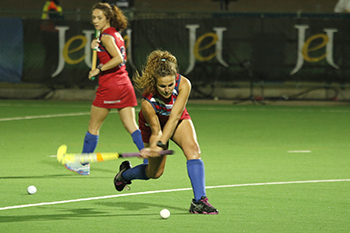 Tanya Britz
Photo: Johan Roux |
Three Kovsies were included in the Protea Women’s Hockey team to compete in a qualifying Africa tournament for the Olympic Games.
Tanya Britz, Nicole Walraven, and Cornelle Botha were chosen to represent their country in Randburg, Johannesburg, from 23 October to 1 November 2015.
All three have been playing for the Kovsie Women’s Hockey team in the Varsity series. The team lost in the finals against the University of Johannesburg in Bloemfontein.
The trio are the only Free State players in the South African group.
Five current Protea players from the University of the Free State (UFS) formed part of the provisional South African squad for the tournament in Randburg.
The other two not fortunate enough to be included in the final Protea team were Liné Malan and Izelle Lategan.
All five players formed part of the Free State Women’s Team that reached the semi-finals in Division A of the interprovincial tournament for the first time since 1986.
Britz, who is nearing 50 tests for South Africa, will probably play club hockey overseas next year.
Walraven, who was named as South Africa’s U21 Player of the Year, and Botha both made their debut on senior level for their country this year.
Both would probably still be available for Kovsies next year.